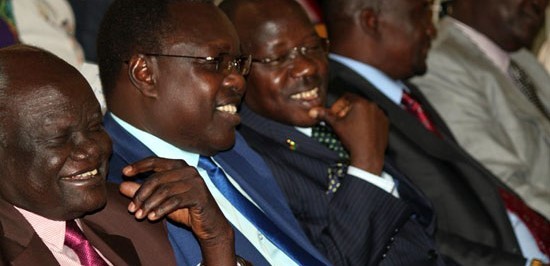The Minority Leader in South Sudan’s National Legislative Assembly Onyoti Adigo Nyikwec said that he agreed with what President Salva Kiir said on the need to have one vision during his address to re-open the parliament last week, but he also thinks key things were missing in the speech.
According to transcript of a speech of the opposition leader issued by the office of Nyikwec, the president was right in saying “Now more than ever, it is critical that we move forward together with one vision for South Sudan.”
“I think the president is right, we should have one vision for South Sudan not to have vision for ourselves, nor for our tribes, or for our regions nor our counties. Our behavior and attitudes should not be guided by strong loyalty to our own tribes and social groups. We should have one vision to build strong our new nation together so that we come out as strong nation in the region and in Africa,” he said.
The president has asked the parliament to work on nine bills and pass them by next year. These include the Petroleum Revenue Management Bill, the Agricultural Bank Bill, The Workers Trade Union Bill, the Right to Access of Information Bill, the Broadcasting Corporation Bill, the Media Authority Bill, the Advocacy Bill, the Pension Scheme Bill and the HIV/AIDS Commission Bill.
Commenting on this, the opposition figure pointed out that some of these bills were already passed by the parliament and were in the Office of the President. He wondered why the president was bringing them back again.
In an interview with Radio Tamazuj on Tuesday, Nyikwec said: “But there are laws which we passed and are now at the presidency. I don’t know why he is bringing them back, like the agriculture and pension bills.”
Overlooked issues
Onyoti Adigo Nyikwec also said that the president’s speech lacked key things which need to be addressed, calling for attention to the hunger in various parts of South Sudan, and for tourism and higher education to be taken seriously by the government.
“It is very unfortunate that the president did not address the acute food shortages in the country especially in Eastern Equatoria state, parts of Jonglei, Unity State, Lakes, Warrap states and Northern Bahr al-Ghazal. We are calling upon the government and the international NGOs to immediately find ways of helping the situation,” read part of the lawmaker’s paper.
He also called attention to issues of transparency in the oil sector, stricter banking controls, corruption, and youth and sports. “It is very unfortunate our president did not talk on corruption this time. Is he defeated by the corrupt elements whom he accused last time? Or the zero tolerance he declared has come to an end? As this oil flow, there is need for transparency and accountability in oil and financial management sectors,” said the document released by the Office of the Minority Leader.
On the matter of youth he made several suggestions: “We ought to take sports as one of our priorities and to encourage the youth voluntary camping during the dry season. We encourage them also to have a role to play to be creative in other fields like farming, small scale entrepreneur and leadership training. The government should open libraries and recreational centers for youth in the towns.”
Nyikwec also criticized the government for the condition of returnees in northern Upper Nile State. “The government is not doing enough to address the major problem of the returnees who are still living in deplorable conditions in Renk and are not able to get food, medical care and education for their children. Most of them have sold out their belongings to get something to eat. Some children have died of malnutrition and lack of medication,” he noted.
Views on the reconciliation process
While admitting the importance of national reconciliation, Nyikwech asserted that it was necessary for the president to first identify the problem and the people who need to be reconciled with each other before forming the committee. Wondering if the reconciliation is about cattle rustling and cattle raiders, or land grabbing and land grabbers, or between the rebels and the government about the rebellion?
“People can agree on what to do. (If) we need to make dialogue, is it dialogue on what? On peace? Of course this is the most important thing,” stated Nyikwec in an interview with Radio Tamazuj.
According to the opposition leader, the reconciliation committee formed by the president is bound to fail because he did not nominate the right person in the right place. The opposition leader pointed that the chairperson of the national reconciliation committee Archbishop Daniel Deng Bul of the Episcopal Church is a member of the Dinka ethnic group who are apparently in conflict with Murle ethnic group in his own hometown of Jonglei.
In his view neither Bul nor a person from the Nuer ethnic group would be right to chair the committee. Nyikwec suggested the former retired catholic bishop of Torit, Taban Paride, who now serves as deputy head of the national reconciliation committee. He said this would have been more appropriate because he is not affiliated to any of the ethnicities involved in the current Jonglei conflict, whether Dinka, Nuer or Murle.
File photo: Honourable Members of the National Legislative Assembly, Juba, South Sudan




